

Upper Primary Phonics. The Place of Phonics. The Place of Phonics. Mr Thorne Does Phonics. Upper Primary Phonics. Grammar for Writing (Key Stage 2) Publication date: Sep 2000 DCSF ref: Audience: Headteacher, Subject leader, Teacher Function: Learning objective guidance, Lesson resources, Planning resources, Units, Teaching and learning Format: Pack, Resource sheet Download.
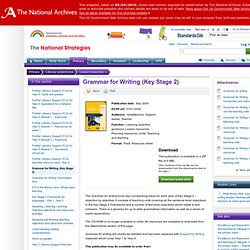
10 Words You Need to Stop Misspelling. 240 Common Spelling Mistakes in English. 240 Common Spelling Mistakes in English by Rebecca English spelling can be tricky, even for English speakers!
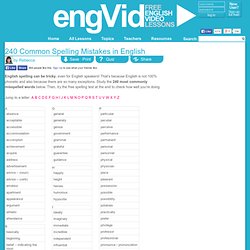
Common spelling mistakes - Grammar tips - Standards and house style - British Council - IBD. Waves of Support. The child’s teacher and other relevant staff in school (eg the SENCO, Gifted and Talented Co-ordinator etc), ideally in consultation with parents, should use a problem solving process to decide on the intervention needed.
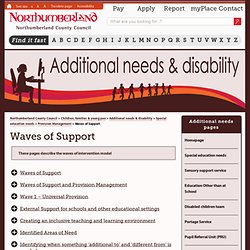
The intervention should be designed to help the child to progress in the areas of need identified. The National Strategies provide objectives which indicate broadly expected outcomes for school aged pupils’ achievements. The Early Years Foundation Stage (EYFS) does the same for children in the Early Years. When children are working outside the broad range of achievements for their age group it is likely they will need something ‘additional ‘ or ‘different from’ the usual quality inclusive teaching. It is likely that the EYFS or National Strategies outcomes (not necessarily from the child’s chronological age year group) will be the targets identified in describing pupils’ needs. Literacy Intervention Programmes. The Place of Phonics. Phonics products and the self-assessment process. Phonics 2 - August 2013. PhonicsPlay - Phonics games, planning, assessments and printables. Phonics products and the self-assessment process. Fabulous Phonics: a creative approach to teaching reading and writing.
Last week, I spent a fascinating afternoon at John Donne primary school with 24 early years and foundation stage (EYFS) teachers listening to deputy head and early years specialist Ruth Moyler share her creative approach to teaching phonics.
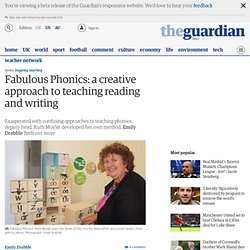
Ruth was first galvanised into taking action on phonics after seeing a group of parents' bewildered reaction to the Letters and Sounds initiative, first introduced to schools across the country in 2007. "I watched the parents trailing out of the meeting with local authority reps, defeated and deflated. I heard them telling each other they didn't understand words the experts were saying and they didn't feel they could now help their child to read.
Read Write Inc. Fresh Start : Primary: Oxford University Press. Mr Thorne Does Phonics. Articulation of Phonemes. Mr Thorne Does Phonics - where learning to read becomes reading to learn. How to learn the letters and sounds of the Alphabet. How to read the Vowel Digraphs Sounds Phonemes. Holycrosswhitwick.org.uk/pgf/doc/0002655hoc-O0-letters and sounds word lists.pdf. Children's Book Week. PhonicsPlay - Phonics games, planning, assessments and printables. What is National Poetry Day? National Poetry Day, remember?
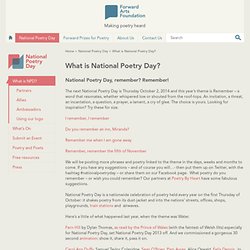
Remember! The next National Poetry Day is Thursday October 2, 2014 and this year’s theme is Remember – a word that resonates, whether whispered low or shouted from the roof-tops. An invitation, a threat, an incantation, a question, a prayer, a lament, a cry of glee. The choice is yours. Looking for inspiration? I remember, I remember Do you remember an inn, Miranda? Remember me when I am gone away Remember, remember the fifth of November We will be posting more phrases and poetry linked to the theme in the days, weeks and months to come. National Poetry Day is a nationwide celebration of poetry held every year on the first Thursday of October: it shakes poetry from its dust-jacket and into the nations’ streets, offices, shops, playgrounds, train stations and airwaves.
Downloads.bbc.co.uk/skillswise/flash/phonics-tool/swf/phonics.swf. Ethnic minority achievement. Enabling every child to fulfill his or her potential is at the heart of the Government's drive to raise school standards.
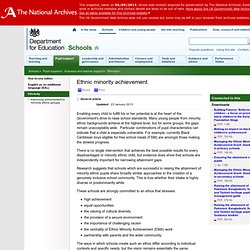
Many young people from minority ethnic backgrounds achieve at the highest level, but for some groups, the gaps remain unacceptably wide. Particular combinations of pupil characteristics can indicate that a child is especially vulnerable. For example, currently Black Caribbean boys eligible for free school meals (FSM) are amongst those making the slowest progress. There is no single intervention that achieves the best possible results for every disadvantaged or minority ethnic child, but evidence does show that schools are independently important for narrowing attainment gaps. Research suggests that schools which are successful in raising the attainment of minority ethnic pupils share broadly similar approaches to the creation of a genuinely inclusive school community. Excellence and Enjoyment: Learning and teaching for bilingual children in the primary years.
Publication date: Jan 2006.
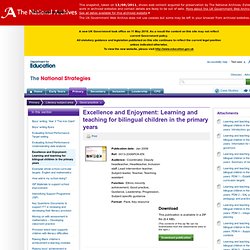
Topmarks Education: teaching resources, interactive resources, worksheets, homework, exam and revision help. Teach Your Monster to Read. Michael Rosen. Authors, Writing and Literacy. Reading For Pleasure – Online Resource Guide. Welcome to the NUT’s Reading4Pleasure zone.
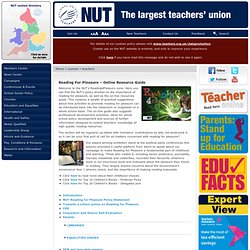
Here you can find the NUT’s policy booklet on the importance of reading for pleasure, as well as the on-line resources guide. This contains a wealth of practical suggestions about how activities to promote reading for pleasure can be introduced back into the classroom or organised on a whole school basis. The on-line guide also suggests professional development activities, ideas for whole school policy development and sources of further information designed to extend teachers’ knowledge of high quality reading resources.
Why teachers should read more children's books. Research has shown that there is value in helping teachers become reading role models for the pupils they teach, and that developing teachers' subject knowledge of children's literature can contribute to a child or young person's enjoyment of reading.
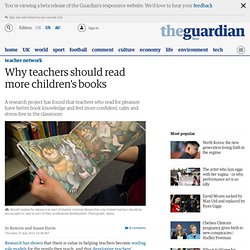
As lecturers in initial teacher training on a PGCE primary programme, we believe that this habit should be developed as an integral part of teacher training. Teachers who read themselves and share their love of books in the primary classroom can, in turn, encourage children to read more. Reading for Pleasure: A research overview.
This paper explores reading for pleasure, its importance, and its impact on literacy attainment and other outcomes.
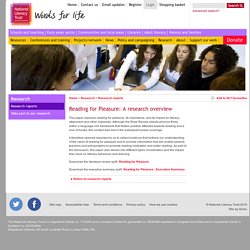
Although the Rose Review placed phonics firmly within a language-rich framework that fosters positive attitudes towards reading and a love of books, this context was lost in the subsequent press coverage. It therefore seemed important to us to collect evidence that furthers our understanding of the value of reading for pleasure and to provide information that will enable parents, teachers and policymakers to promote reading motivation and wider reading.